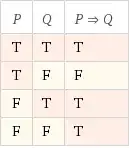No, in your example, knowing $P(1)$ is false tells us absolutely nothing about the truth value of $P(n)$, $n> 1$.
Even if we know in advance that the entire implication is true, so that it is true that $P(k) \implies P(k+1)$, and we also learn that $P(k)$ is false, then we still cannot conclude anything about the truth or falsity of $P(k + 1)$, even though the implication is true.
We have defined implication (aka the material conditional), as it is used in logic and in math, such that $$\text{FALSE} \implies P(x)\quad \text{ is always true}.$$
Indeed, by definition:
$$P \implies Q \quad \text{is FALSE if and only if}\;\; P \;\;\text{is true}\;\;{\bf and}\;\; Q \;\;\text{is false}.$$
Recall the truth-table for the implication $P\implies Q$ which gives all possible truth-value assignments to P and Q, and the resultant truth value of $P\implies Q$:

